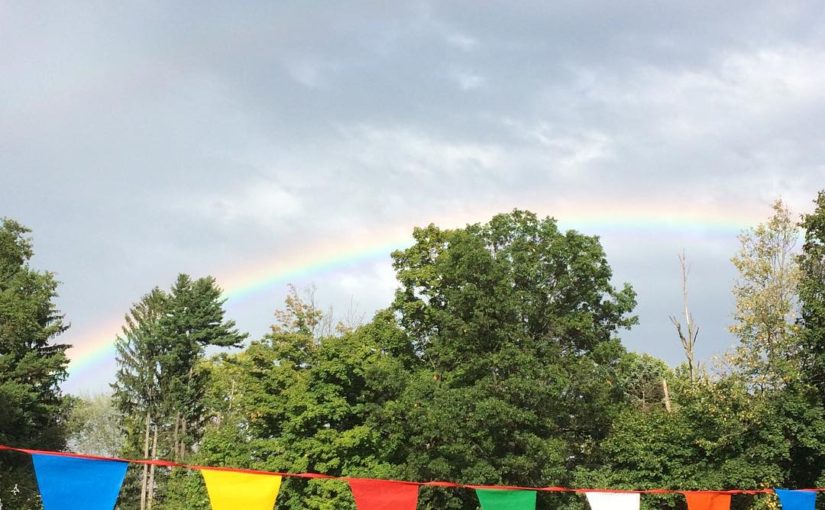In the fifteenth year of the reign of Emperor Tiberius, when Pontius Pilate was governor of Judea, and Herod was ruler of Galilee, and his brother Philip ruler of the region of Ituraea and Trachonitis, and Lysanias ruler of Abilene, during the high priesthood of Annas and Caiaphas, the word of God came to John son of Zechariah in the wilderness. He went into all the region around the Jordan, proclaiming a baptism of repentance for the forgiveness of sins, as it is written in the book of the words of the prophet Isaiah, “The voice of one crying out in the wilderness: ‘Prepare the way of the Lord, make his paths straight. Every valley shall be filled, and every mountain and hill shall be made low, and the crooked shall be made straight, and the rough ways made smooth; and all flesh shall see the salvation of God.’”
Luke 3:1-6
My sermon from the 2nd Sunday of Advent (December 6, 2015) on Luke 3:1-6. Listen to the recording at the bottom of the page or read my manuscript below.
****************************
So, like many of us, if I don’t have my phone on me at all times, I feel a bit…uncomfortable. I get worried. My heartrate goes up and I act a little irritated because, well, I want my phone. And I get this way when I lose my phone for two reasons. One, my phone is the primary way I interact, communicate, and learn about my world. And, two, my phone is also my clock. It tells me my time. So when I forget my phone and I find myself, say, stuck in Bergen Town Center, where there isn’t a clock in the entire place – it doesn’t take long before I’m desperately trying to find out what time it is. There’s probably a good scientific and psychological explanation for why I get this way. And I wish I knew what that was. But I do know that when I know the time – the hour, the minute, the seconds – even the day and the year – I’m able to structure my world, understand my place in the universe, and connect myself to all the other events that are happening all around me. How we describe time – say by using a calendar, or a church calendar, or something else entirely – how we describe time shows where we are in history. And that’s what Luke is doing in our text today. We’re past the beginning. We’re past the moment when an angel speaks to Mary, past the point when Zechariah loses his voice in the Temple, and we’re beyond Jesus being born in a manger. We’re somewhere else. So Luke tells us where we are by telling us the time. But instead of saying it’s 9:20/11:05 am on Sunday, December 6, Luke tells us the time by telling us who’s in power.
Now, this way of telling time was common in Luke’s day. It’s also common today. When we talk about President Barack Obama, we sometimes hear that it’s the 7th year of his presidency. Elected officials in our country are described and defined by their length of time in office. So Luke starts at the very top of his world, with the Roman Emperor Tiberius who’s been in charge for 15 years. And then Luke moves down the hierarchy – first to Rome’s representative in Judea – Pontius Pilate – and to King Herod, an ally of Rome, who rules over parts of Jesus’ hometown. Philip and Lysanius are kings, leaders in territories that Jesus and his disciples will shortly visit. So after taking a look at the political leaders, Luke then moves into the religious. We hear about Annas and Caiphas, high priests, busy doing God’s work in the Temple and in the land. This hierarchy of authority is Luke’s way of telling us the time. It’s also Luke’s way of telling us what Jesus’ world looked like. It didn’t matter if someone was in the middle of Italy or fishing on the Sea of Galilee, their lives were defined by their time. And it’s at this specific time, in this specific world, with these specific people in power, that God speaks. And God’s word rumbles out of the mouth of a soul in the wilderness named John.
Now, as Christians, John the Baptist matters. He is part of our story. John notices Jesus before others do and he baptizes Jesus in the Jordan river. So since we are called to tell Jesus’ story, John the Baptist matters to us. But if we look at the list that Luke just laid out, a list full of people and places, emperors, kings, and priests, if we played a game of “what’s not like the other,” well, John is the obvious answer. He doesn’t fit. Everyone else in that list has power. Everyone else has people who will listen to them. But it’s the one in the wilderness, far from the cities and places where people define who is important and who isn’t – that’s who God speaks to. That’s who God uses. At this specific time, and in this specific place, it’s not the person in the white robe or the soldier’s uniform, or the business suit that God uses to announce Jesus. Instead, the one wearing camel hair and eating bugs prepares the way for Jesus. Preparing for Jesus isn’t tied to what we have or who people think we are. Preparing for Jesus is tied to who calls us. And if God called a nobody in the wilderness to prepare the way for the Lord – just think what we can do since God is calling us to prepare the way for the Lord too.
Now, I’ve spent a lot of time this week preparing.” Being in the middle of a move can do that to a person. I just have a ton of things to prepare. There’s rooms to paint, utilities to move, floors to clean, and an astronomically large number of toys that need to be boxed, tossed, and transported. And as I’m speaking right now, in the back of my head, I’m listing all the things that I haven’t done. yet. You’d think that someone who’s lived in four different places since he’s three year old was born would know how to prepare for a move at this point in their life. And I honestly believe that, each time I move, I’m better at moving than I was before. I made it through my last move only breaking two wine glasses. That’s good for me. But I’m not perfect. Things do break. Boxes do get mixed up. And I’m still, at the last minute, going to be throwing a bunch of things in a black plastic bag to toss in the back of my mini-van. Even after all these moves, I’m still learning how to prepare well.
And that’s frustrating. It’s frustrating still learning how to prepare well. It’s upsetting knowing that I’m still not going to get this move just right. It’s not hard to see all that we do, all that we try, all the preparation we put in – and wonder – just what it’s all for.
That frustration – that questioning – well, it’s not hard to look around at our world, and wonder about our preparation too. This week, there was another shooting. Another terrorist attack. And that’s just one big story in a week full of our stories where we’ve wondered and questioned just what we’re doing. We’re we’ve been frustrated by our own preparations. There’s the diagnosis or the fact that the doctors still don’t know what’s wrong. There’s that lost job, that uncovered secret, that unexpected anxiety, and then there’s fear. The Christmas season is suppose to be the happiest time of the year – but that doesn’t mean we’re fully prepared for what our world and what our lives will bring about.
But that’s Luke’s point. That’s what Luke is saying in these opening words from chapter 3. Like pulling out our phones to see what time it is, Luke is painting a picture of Jesus’ time and just how prepared the world was for him. A world where a Roman Emperor proclaimed his own divinity. A world where nations rose up against other nations. A world where slavery was normal, wars common, and a world where a Roman governor occupied God’s holy city. No one was prepared for what was going to happen next. No one knew that a kid from Nazareth, stumbling through the water in the Jordan, was God’s Son. No one knew that a carpenter’s son from the wrong side of the tracks would cast out demons and heal the sick while embracing everyone – children, tax collectors, prostitutes, and even those who followed a different religion than he. No one knew that when Jesus was nailed to a Cross, his arms would be opened wide for the entire world so that everyone could see the salvation of God. No one was prepared for what God was about to do – but God was prepared to do whatever it took to love the world.
The good news isn’t that we can, somehow, prepare the world so Jesus will come. Our goods news is that, in spite of our world, Jesus comes anyways. In our specific place, in our specific time, and in our specific lives, Jesus comes – not because we’re perfect – but because God loves and love acts. Love is more than a feeling. It’s a verb. It’s something that we can do even when our feelings say otherwise. When our world and our lives seem to encourage brokenness rather than love, we can still love. When our world and our lives want to divide God’s creation into us and them, we can still love. And when we don’t know what to do, when we want to run in fear and hide, it’s then when we can let our love overflow.
Letting our love overflow is something that anyone can do. It doesn’t matter if we’re two or ninety two. We don’t have to be an emperor to love. We don’t have to be a queen to take care of our neighbor down the road. God isn’t waiting for the right people to show up before God loves the world. God, instead, is calling us too. We might not be kings. We might not be emperors. And we might not be faithful as we wish. But we belong to a God who called a nobody in the desert to prepare for Jesus. We belong to a God who partnered with an unwed teenager to bring Jesus into the world. We belong to a God who has decided that all of us are here at the right time and in the right place to let our love overflow.
Amen.
Podcast: Play in new window | Download



